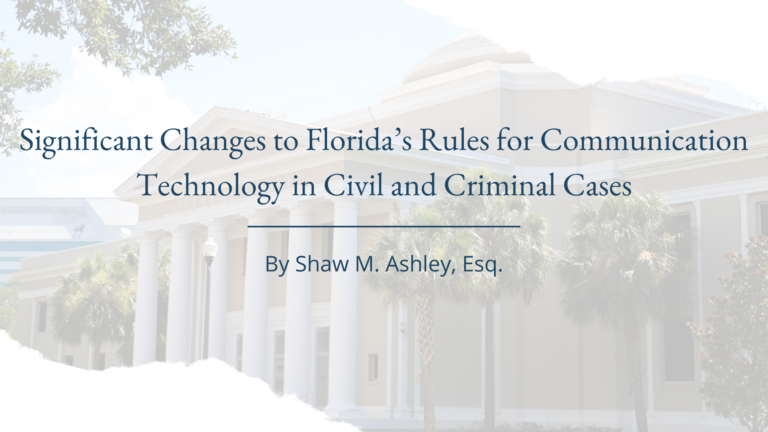The Florida Supreme Court issued a new Order on July 14, 2022 regarding communication technology in civil and criminal cases. A summary on this ruling can be found below. To read the full SC21-990 Opinion click HERE or visit the Florida Supreme Court website.
Fla. R. 2.530 (Communication Technology)
- Allows a court official to authorize communication technology upon a party’s written motion or at the discretion of the court official.
- A party may file an objection in writing within 10 days or within a period directed by the court official.
- Court official is required to grant a motion to use communication technology for non-evidentiary proceedings scheduled for 30 minutes or less absent good cause to deny it.
- A motion to present testimony through communication technology is required to set forth good cause and specify whether each party consents to the form requested. Only audio-video (as opposed to audio communication only) is authorized for the testimony of a person whose mental capacity or competency is at issue.
- Oath can be administered via audio-video.
- Prospective jurors can participate in voir dire and empaneled jurors can participate in a trial through audio-video communication technology when authorized by another rule of procedure.
Fla. R. Gen. Practice 2.516 (Service of Pleadings and Documents)
- Amended to require non-represented parties to designate an email address for service, unless excused by clerk of court after declaring the party does not have an e-mail account or does not have regular access to the internet.
Fla. R. Civ. P. 1.430 (New: Juror Participation through Audio-Video Communication Technology)
- Allows prospective jurors to participate in voir dire and empaneled jurors to participate in civil trial through audio-video communication when stipulated by the parties in writing and authorized by the court.
Fla. R. Civ. P. 1.310 (Depositions Upon Oral Examination)
- Can occur through communication technology when ordered by court, or without leave of court if stipulated by the parties.
Fla. R. Civ. P. 1.700 (Mediation and Arbitration)
- Authorized to use communication technology by stipulation of parties or by court order.
Fla. R. Small Claims 7.150(b)
- Allow jurors in small claims cases to participate in voir dire and trials via audio-video communication technology when stipulated by the parties in writing and authorized by the court.
Fla. R. App. P. 9.320 (Oral Arguments)
- Party can request to appear using communication technology.
- Court’s discretion.
- Must be recorded and made publicly available.
- Court may recess in the event of malfunction.

